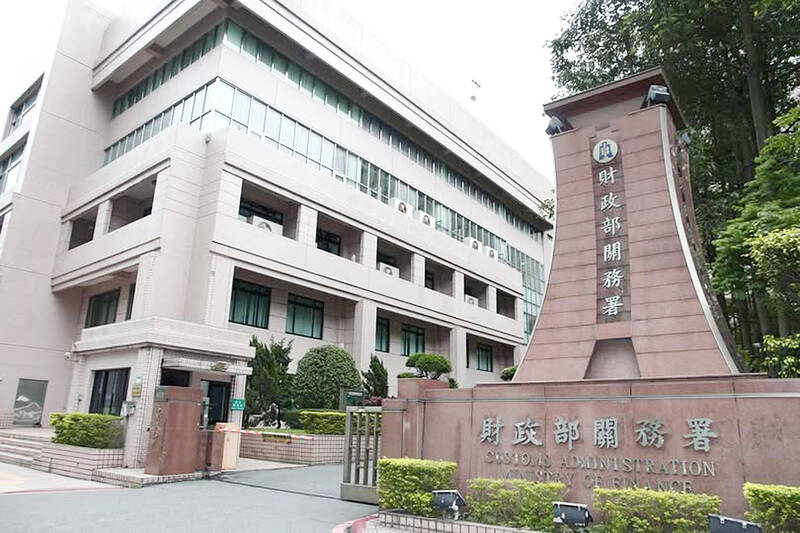The Customs Administration has flagged 72 export shipments to the United States for false or missing country-of-origin labeling, the result of heightened enforcement aimed at preventing the transshipment of Chinese goods to avoid US tariffs.
Customs Administration Deputy Director-General Chao Tai-an (趙台安) said yesterday that inspection teams reviewed 6,962 shipments between April 1 and June 15 and found the violations primarily among general exports from tax areas.
He said the cases have been referred to the Ministry of Economic Affairs’ International Trade Administration, which can impose fines of up to NT$3 million under Taiwan’s Foreign Trade Act (貿易法).

Photo: Taipei Times
Products found in shipments that were in violation included computer cases, transformers, plastic products, air compressors, fans and lighting fixtures, the customs administration said.
Chao added that the agency also inspected 280 US - bound shipments from free trade zone operators during the same period and found no violations.
Under the Act for the Establishment and Management of Free Trade Zones, violators in those zones face a lower maximum fine of NT$300,000.
In response to concerns that the penalty ceiling in free trade areas is too low, the Ministry of Transportation and Communications -- which oversees the free trade zones -- is currently reviewing whether to raise the maximum fine 10-fold to NT$3 million in line with the Foreign Trade Act.
Chao also said that since May 7, exporters of Taiwan- made goods to the U.S. must submit a Certificate of Origin and mark "YT" in the designated code field on their customs declaration.
He said that 116,000 such certificates had been reviewed as of June 15.
Chao warned that companies submitting false declarations would be referred to the judicial authorities for related violations.

The first global hotel Keys Selection by the Michelin Guide includes four hotels in Taiwan, Michelin announced yesterday. All four received the “Michelin One Key,” indicating guests are to experience a “very special stay” at any of the locations as the establishments are “a true gem with personality. Service always goes the extra mile, and the hotel provides much more than others in its price range.” Of the four hotels, three are located in Taipei and one in Taichung. In Taipei, the One Key accolades were awarded to the Capella Taipei, Kimpton Da An Taipei and Mandarin Oriental Taipei. Capella Taipei was described by

The Taichung District Court yesterday confirmed its final ruling that the marriage between teenage heir Lai (賴) and a man surnamed Hsia (夏) was legally invalid, preventing Hsia from inheriting Lai’s NT$500 million (US$16.37 million) estate. The court confirmed that Hsia chose not to appeal the civil judgement after the court handed down its ruling in June, making the decision final. In the June ruling, the court said that Lai, 18, and Hsia, 26, showed “no mutual admiration before the marriage” and that their interactions were “distant and unfamiliar.” The judge concluded that the couple lacked the “true intention of

EVA Airways today confirmed the death of a flight attendant on Saturday upon their return to Taiwan and said an internal investigation has been launched, as criticism mounted over a social media post accusing the airline of failing to offer sufficient employee protections. According to the post, the flight attendant complained of feeling sick on board a flight, but was unable to take sick leave or access medical care. The crew member allegedly did not receive assistance from the chief purser, who failed to heed their requests for medical attention or call an ambulance once the flight landed, the post said. As sick

INDUSTRY: Beijing’s latest export measures go beyond targeting the US and would likely affect any country that uses Chinese rare earths or related tech, an academic said Taiwanese industries could face significant disruption from China’s newly tightened export controls on rare earth elements, as much of Taiwan’s supply indirectly depends on Chinese materials processed in Japan, a local expert said yesterday. Kristy Hsu (徐遵慈), director of the Taiwan ASEAN Studies Center at the Chung-Hua Institution for Economic Research, said that China’s latest export measures go far beyond targeting the US and would likely affect any country that uses Chinese rare earths or related technologies. With Japan and Southeast Asian countries among those expected to be hit, Taiwan could feel the impact through its reliance on Japanese-made semi-finished products and